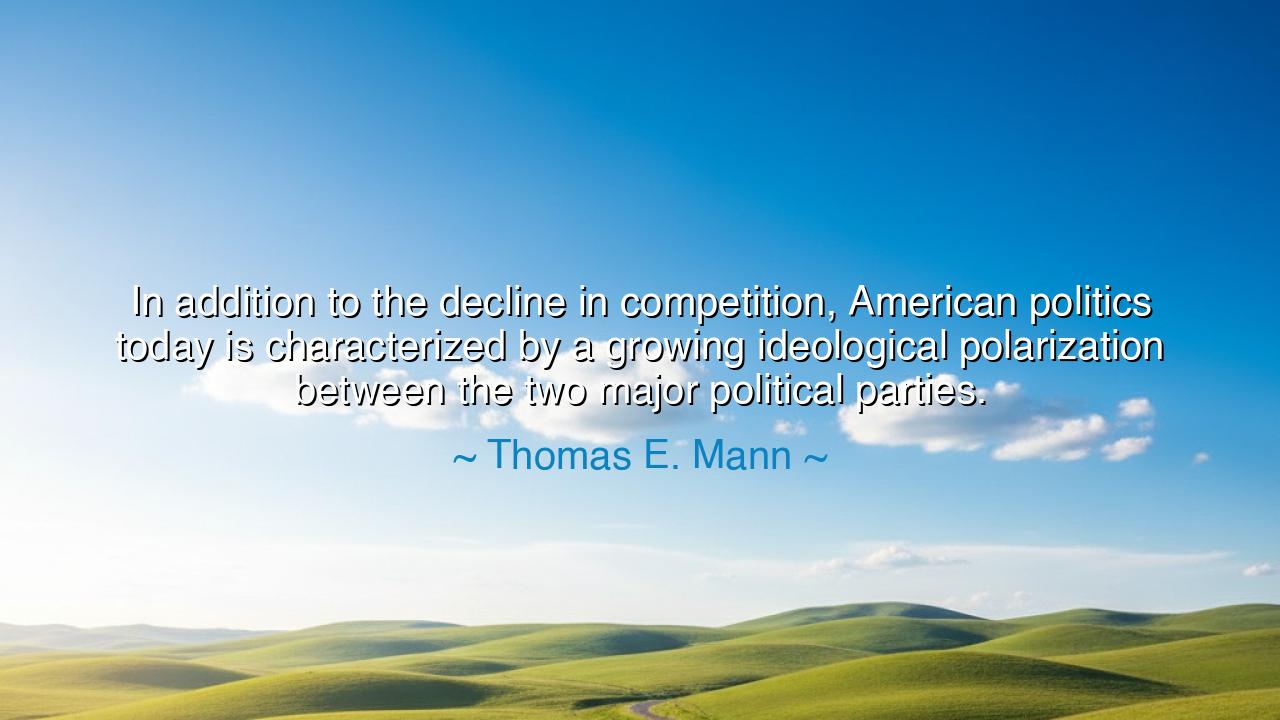
In addition to the decline in competition, American politics
In addition to the decline in competition, American politics today is characterized by a growing ideological polarization between the two major political parties.






The words of Thomas E. Mann — “In addition to the decline in competition, American politics today is characterized by a growing ideological polarization between the two major political parties.” — strike like a diagnosis of a wounded republic. They speak of a system once nourished by vigorous competition, where debate sharpened ideas and compromise shaped progress, but which now suffers from deep polarization, where partisanship consumes the common good. Mann’s words reveal a truth: when parties drift too far apart, they no longer contend for solutions, but for survival, and the people are left adrift between them.
The heart of this saying is the recognition that politics thrives not on unity of thought, but on balance between differences. Healthy competition ensures that no one voice dominates, that truth emerges from debate, and that leaders remain accountable. Yet when polarization hardens, dialogue turns into warfare, and rivalries cease to be about ideas and become about enemies. The battlefield of democracy then becomes barren, with scorched trust and broken discourse.
History offers grim reminders. In the final days of the Roman Republic, factions hardened between populares and optimates, each seeking power not through compromise but through destruction of the other. Julius Caesar crossed the Rubicon not merely as a man of ambition, but as the product of a system where polarization had made cooperation impossible. The republic perished, not because of lack of brilliance or resources, but because rivalry had grown into hatred. Mann’s words echo this ancient warning for America.
Yet the lesson is not despair but vigilance. When competition is fair and honest, it strengthens democracy. When ideological polarization poisons discourse, it weakens it. Citizens must guard against the temptation of extremes, remembering that compromise is not weakness, but the very foundation of governance. Just as a bridge needs both sides to hold, so too does a republic need parties willing to meet in the middle.
Let future generations take heed: politics is not war, but stewardship; not conquest, but care. The decline of competition and the rise of bitter polarization are signs of danger, but also a call to renewal. For the strength of a democracy lies not in one party’s triumph, but in the shared commitment of all to seek the common good, even amidst difference. Mann’s words are both a warning and a challenge — that the fate of a nation rests not only on its leaders, but on the wisdom of its people to demand cooperation over division.






TTThuy Ta
I’ve been thinking about Thomas Mann’s point on political polarization, and it seems like a serious challenge to our democracy. With both parties growing more ideologically rigid, how do we ensure that voters who don’t fit neatly into either camp are represented? Are third parties a viable solution to this polarization, or do they only add more division? It feels like there’s a need for a shift in how we engage with politics to address this growing divide.
XDNguyen Xuan Duc
This quote makes me think about how difficult it is to have a balanced discussion when both major parties seem so far apart. What happened to the idea of compromise for the greater good? Has ideological purity become more important than practical solutions? I feel like many issues are being seen only through the lens of party loyalty, and that’s preventing real progress. Could this increasing polarization lead to political apathy as people become frustrated with both sides?
MYMarz Yuep
I agree with Mann’s assessment that American politics is increasingly polarized, but I wonder if this is an inevitable consequence of our current political system. Could the structure itself—like gerrymandering or the way elections are run—be exacerbating this divide? Are the two major parties more ideologically divided than ever because of structural factors that make it harder for moderate voices to be heard? What steps could be taken to reduce this polarization in the long term?
HNphan thi huynh nhu
Thomas E. Mann’s observation on the ideological divide in American politics really resonates with me. It feels like the growing polarization is affecting more than just political discourse—it’s eroding the potential for meaningful dialogue and compromise. Can this divide really be mended, or is the country headed towards a future of gridlock and heightened tensions? Is it even possible for the two major parties to find common ground anymore, or is the divide too entrenched?